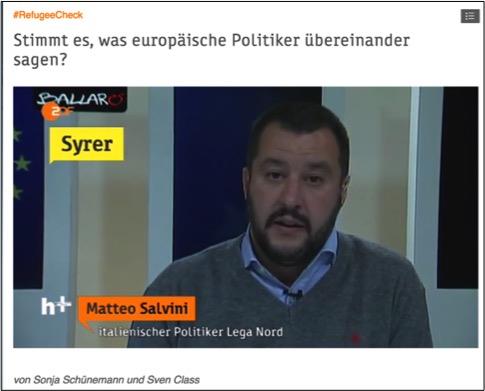How European media terminates the broadcasting of stereotypes: #RefugeeCheck
#RefugeeCheck was launched to fact-check their statements in a collaborative, cross-national approach, an idea of Sonja Schuenemann at German public broadcaster ZDF. While European politicians still struggle to find one voice, Europe’s media has the chance to rethink the role of national news organisations, and broadcasters in a pan-European context.

A lot has been written about how the refugee crisis has turned into a crisis for Europe while countries like Jordan, Lebanon and Turkey, have been dealing with it for a few years already, as Ann Cooper, a professor of professional practice in international journalism at Columbia University pointed out. We can find background explainers, stories of journalists sharing their very personal experiences and human interest stories, which show how the public is trying to find and develop strategies to help like the small Muslim community in Hungary.
But if politician Matteo Salvini, leader of Italy’s the Lega Nord political party, in an appearance on TV claims that Chancellor of Germany Angela Merkel would only take Syrian refugees of Christian faith and that she would want Italy to “take the rest”, is it true or populism? A fact-checking shows: it is not true. In fact, only 25 per cent of asylum applications are from Syrians, 75 per cent from refugees from other countries and 82.6 of the Syrian refugees are Muslims, as Heute plus or h+/Germany reports.
Heute plus is one of five media partners from Italy, Spain, France and United Kingdom, which joined a collaborative approach to fact-check statements of politicians in their European neighborhood to stop the broadcasting of stereotypes. Other participating news platforms are Pagella Politica, Virus/Rai-2, both Italy, laSexta/Spain, Libération/France and Fullfact/UK now fact-check claims of politicians in other European countries as well.
@indiesemNetz Media partners 5 countries involved to analyze the refugee crisis through fact-checking in tvshow. https://t.co/HAKf2Y14xi
— Virus Rai (@VirusRai2) November 29, 2015
With the refugee crisis now turned into a pan-European issue, media faces new challenges to cover the cross-border developments appropriately. What’s the role of media, when a subject is not limited to national borders anymore? How can news organizations work effectively together to address issues of pan-European importance? #RefugeeCheck shows, that fact-checking of pan-European issues require international cooperation across borders, and that such models will enrich the media landscape to the benefit of the public in each country.
Additional links/where to watch:
How The Media Are Reporting On Europe’s Refugee Crisis
#RefugeeCheck: a Europe-wide fact-checking initiative
Wolfgang Blau: give pan-European media a chance
More like this
Successful strategies for news organisations revealed in Reuters Institute report
Why should modern media companies look outside news businesses for revenue opportunities?









